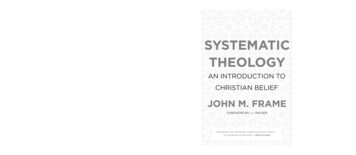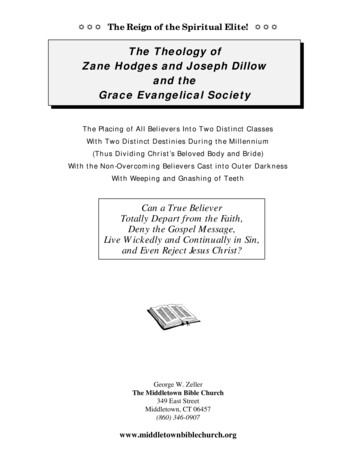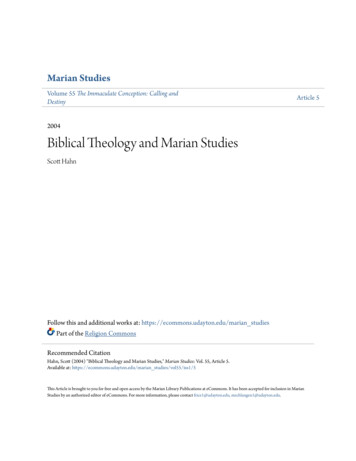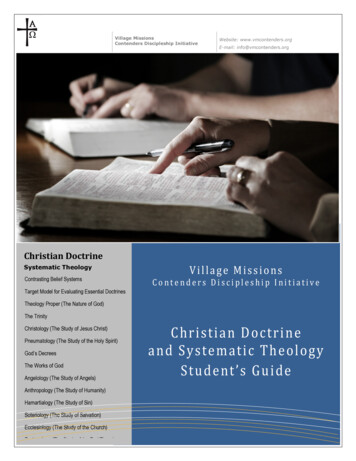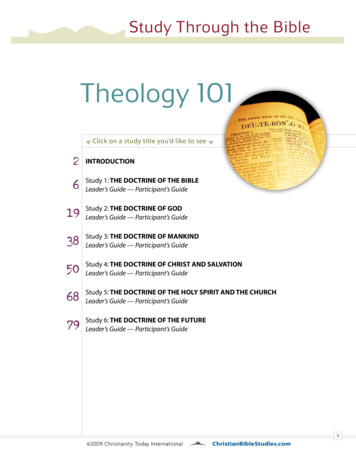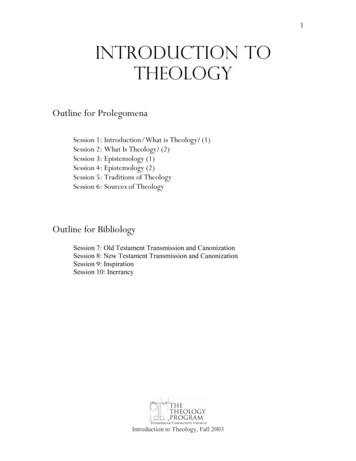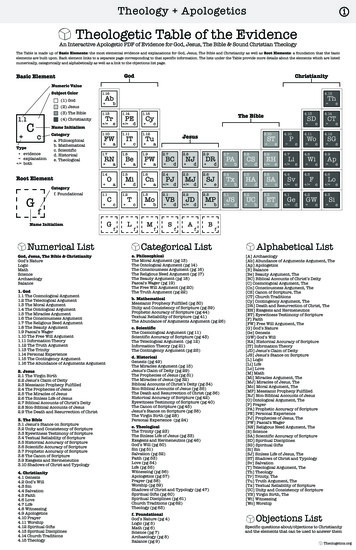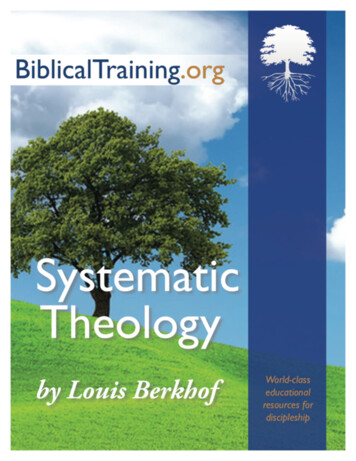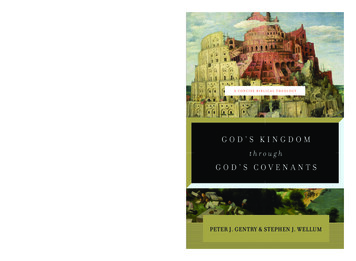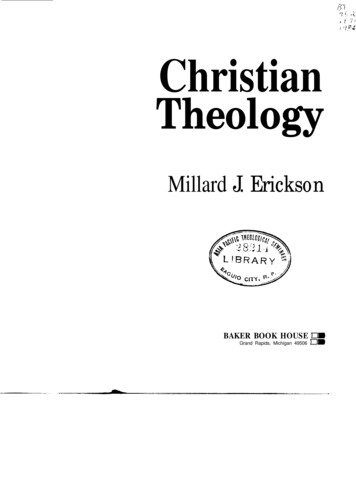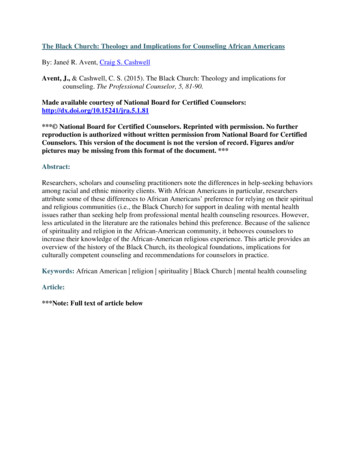
Transcription
The Black Church: Theology and Implications for Counseling African AmericansBy: Janeé R. Avent, Craig S. CashwellAvent, J., & Cashwell, C. S. (2015). The Black Church: Theology and implications forcounseling. The Professional Counselor, 5, 81-90.Made available courtesy of National Board for Certified * National Board for Certified Counselors. Reprinted with permission. No furtherreproduction is authorized without written permission from National Board for CertifiedCounselors. This version of the document is not the version of record. Figures and/orpictures may be missing from this format of the document. ***Abstract:Researchers, scholars and counseling practitioners note the differences in help-seeking behaviorsamong racial and ethnic minority clients. With African Americans in particular, researchersattribute some of these differences to African Americans’ preference for relying on their spiritualand religious communities (i.e., the Black Church) for support in dealing with mental healthissues rather than seeking help from professional mental health counseling resources. However,less articulated in the literature are the rationales behind this preference. Because of the salienceof spirituality and religion in the African-American community, it behooves counselors toincrease their knowledge of the African-American religious experience. This article provides anoverview of the history of the Black Church, its theological foundations, implications forculturally competent counseling and recommendations for counselors in practice.Keywords: African American religion spirituality Black Church mental health counselingArticle:***Note: Full text of article below
The Black Church: Theology and Implicationsfor Counseling African AmericansJaneé R. AventCraig S. CashwellThe Professional CounselorVolume 5, Issue 1, Pages 81–90http://tpcjournal.nbcc.org 2015 NBCC, Inc. and Affiliatesdoi:10.15241/jra.5.1.81Researchers, scholars and counseling practitioners note the differences in help-seeking behaviors among racial andethnic minority clients. With African Americans in particular, researchers attribute some of these differences toAfrican Americans’ preference for relying on their spiritual and religious communities (i.e., the Black Church) forsupport in dealing with mental health issues rather than seeking help from professional mental health counselingresources. However, less articulated in the literature are the rationales behind this preference. Because of thesalience of spirituality and religion in the African-American community, it behooves counselors to increase theirknowledge of the African-American religious experience. This article provides an overview of the history of theBlack Church, its theological foundations, implications for culturally competent counseling and recommendationsfor counselors in practice.Keywords: African American, religion, spirituality, Black Church, mental health counselingKuczewski (2007) asserted that helping professionals often are charged to care for “vulnerable personsfacing difficult situations and tragic choices” (p. 9). Often, within the counseling context, client spirituality is animportant part of the healing process. There is substantial evidence that one’s religious life is a critical featureof the developmental process and can serve to improve one’s overall well-being (Cashwell & Young, 2011).Further, researchers have found positive benefits to incorporating spirituality and faith into one’s life, includingimproved physical (Matthews et al., 1998) and psychological (Joubert, 2010) health. Therefore, counselors areexpected to assess the impact of a client’s spirituality and religion on his or her mental health and overall wellbeing (Cashwell & Watts, 2010). Moreover, attending to the spiritual needs of clients is an essential part ofdeveloping culturally sensitive treatment plans and recommendations (Kuczewski, 2007).Not unlike other racial groups, African-American families rely on spirituality as a source of support as theyface various challenges. These challenges include both systemic oppressions (e.g., overt racism) and familialstressors (e.g., parenting). Given these life stressors, perhaps spirituality and religion offer some explanationas to why African Americans are better adjusted and more psychologically well than some experts expect andpredict (Bell-Tolliver & Wilkerson, 2011).Nearly 80% of African Americans identify religion as important compared to only 50% of the generalpopulation (Pew Research Center, 2009). Further, a majority of African Americans identify as Christian,and 50% of African Americans attend church services weekly. The majority of African Americans attend apredominantly African-American church (Pew Research Center, 2009). Many African Americans identify Godas a core aspect of their coping, and rely on their religion and spirituality during difficult life transitions (BellTolliver & Wilkerson, 2011; Whitley, 2012). Additionally, African Americans assert that attending worshipJaneé R. Avent, NCC, is an Assistant Professor at the University of Texas-San Antonio. Craig S. Cashwell, NCC, is a Professor at theUniversity of North Carolina-Greensboro. Correspondence can be addressed to Janeé R. Avent, 501 César E. Chávez Blvd. DB 4.344, SanAntonio, TX 78207, janee.avent@utsa.edu.81
The Professional Counselor/Volume 5, Issue 1services and Bible study, being involved in their churches, having devotion time, and listening to religioussermons and gospel music allow them to conceptualize their struggles within the larger struggle between goodand evil, or God and the devil (Whitley, 2012).Because of the salience of spirituality and religion in the experience of African Americans, it behoovesprofessional counselors to increase their knowledge and awareness of the African-American religiousexperience, particularly as it relates to psychological health. Several researchers (Ayalon & Young, 2005;Woodward, 2011) have found that African Americans tend to seek professional counseling at a much lowerrate than other racial and ethnic populations. Further, African Americans often choose their spiritual leadersand churches as resources for their mental health needs instead of professional counselors (Ayalon & Young,2005). Thus, one area of the African-American religious experience that needs further attention from counselorsis the Black Church. The Black Church is the term used in popular culture and scholarly literature to refer tothe overall institution that encompasses individual, predominantly African-American Christian congregations(Lincoln & Mamiya, 1990).In order to understand the Black Church and the people who worship therein, counselors must familiarizethemselves with the historical context and theological underpinnings that frame the Black Church and likelyinfluence individual parishioners’ help-seeking behaviors. The purpose of this article is to provide a briefoverview of the history and development of the Black Church, built upon unique theological foundations. Theseelements of history and theology have important implications for counselors working with religious AfricanAmerican clients.History of the Black ChurchSimilar to African-American communities, the Black Church has experienced change, progression,challenges, struggle and resilience. Counselors must understand the historical role and relevance of the BlackChurch in African-American communities in order to better understand African-American mental health helpseeking behaviors. This section will provide an overview of the Black Church’s inception during slavery, its rolein the Civil Rights Era and its relevance in the lives of many African Americans in the 21st century. This historywill provide counselors with a context for understanding the Church’s salience in the lives of many of theirreligious African-American clients.The Black Church and SlaveryDuring slavery, many plantation owners forbade more than five slaves to gather at a time withoutsupervision by a White overseer. Although slaves possessed a desire for religious and spiritual expression,this rule complicated their ability to assemble for worship services and stifled their sense of community andopportunities for fellowship. Thus, in fear of repercussions for breaking these rules, slaves resorted to informalworship gatherings in secret locations (e.g., swamps and wooded areas; see Frazier, 1963; Lincoln, 1973).Eventually, during the mid-1700s, these informal gatherings became less secretive and more visible (Pinn,2011), laying the foundation for the institution that would be become known as the Black Church. The churchesbecame the epicenter of the slaves’ community and a place of education and fellowship that slaves lackedelsewhere on the plantation.During the genesis of the Black Church, plantation owners feared that if slaves were able to read theBible, their proclivity to defer hopes of freedom until after death would decrease, and a surge of strength anddemand for emancipation would emerge. Slave masters feared that slaves would acquire a comprehensiveknowledge of Scripture that would illuminate the flaws and Biblical inconsistencies of a despotic slave system.With a comprehensive knowledge of Scripture, slaves would have an increasingly difficult time reconciling a82
The Professional Counselor/Volume 5, Issue 1Biblically based system that would capture and enslave innocent people (Taylor, Thornton, & Chatters, 1987).As predicted, slaves became discontented with their situation and used the Church as a means to bring aboutchange. As slaves’ Scriptural knowledge grew, so did their frustration with organized religion, particularlyChristianity. Slaves viewed Christianity as another vehicle used by Whites to advance oppression (Lincoln &Mamiya, 1990).Slave masters and their families treated slaves poorly even though they worshipped together in the samebuildings. Instead of church being a sacred haven away from maltreatment, it was another opportunity forWhites to exert their power, which became overwhelming for many Blacks (Lincoln & Mamiya, 1990). Thus,slaves incepted their own churches out of a desire to have their own worship places on Southern plantations andescape discrimination on Sunday mornings (Lincoln, 1973). Richard Allen inaugurated the first Black churchof the Methodist denomination in 1807 (Wilmore, 1998). The formation of the Black Methodist churches wasconsidered a visceral response to the Methodist tradition of having segregated churches for Blacks and Whites.This departure of Blacks from the Methodist Church was one of the first major civil rights protests by AfricanAmericans (Lincoln & Mamiya, 1990). Subsequently, African Americans formed predominantly AfricanAmerican congregations of Baptist, Presbyterian and Episcopal denominations (DuBois, 1903), setting the stagefor the prominent emergence of the Black Church during the Civil Rights Era. Slaves felt that they could bethemselves and their status as slaves did not subsume their identity in these churches. These services providedtherapeutic relief and a departure from the pressures and brutality experienced on the plantation (Wilmore,1998).In essence, church services and religious and spiritual resources operated much like counseling sessions.Slaves found hope in the Scriptural promises of a future void of oppression. They looked forward to deathas a transition from suffering on earth to a promise of reward and deliverance in Heaven (Johnston, 1954;Wilmore, 1998). Slaves especially could relate to the persecution and torment of Jesus Christ, the pivotal figureof Christianity. In fact, slaves even likened the crucifixion experienced by Christ to the popularized practice oflynching Black men (Pinn, 2010; Terrell, 1998). Terrell (1998) further elaborated that the connection betweenJesus and slaves also was related to the Bible story of Judas betraying Jesus for economic compensation. Slavesknew that White plantation owners betrayed, captured and brought them to America for others’ economic gain(Pinn, 2011; Terrell, 1998).Although slaves faced horrendous conditions on plantations, counseling services obviously were notavailable as a support and therapeutic release. During this time, the Church was the primary resource for supportand change during life challenges. It is likely that this proclivity to seek support from the Church began duringslavery and continues today. This historical precedent could help explain why African Americans are less likelythan many other racial/ethnic groups to seek support from professional counselors (Ayalon & Young, 2005).The Black Church and Civil RightsDuring the 1950s and 1960s, the Black Church became increasingly more autonomous as it began expandingdoctrinal beliefs, electing leaders and even creating seminary institutions to educate its leaders (Lincoln, 1973).Further, the Black Church offered a platform for activists to promote messages of equal rights for AfricanAmericans (Chandler, 2010). The Black Church worked at both the macro and micro levels of society. Forexample, on the macro level, large institutions such as the NAACP garnered support (e.g., financial, emotional)from the Black Church (Chandler, 2010). At a more micro level, individuals with difficulty fulfilling financialobligations received economic assistance. The Black Church’s growing financial independence initiated theself-help doctrine, as African Americans could not rely on support from outside sources. African Americanslearned that in order to survive they had to support themselves financially, mentally, emotionally and socially83
The Professional Counselor/Volume 5, Issue 1(Littlefield, 2005). It is possible that African Americans may still maintain this perspective, and therefore maybe less likely to seek support from resources such as professional counselors.Particularly during the Civil Rights Era, the Black Church was a place that Blacks could experienceprestige, rank and authority otherwise denied them by outside institutions, which were typically dominatedby the majority culture (Douglas & Hopson, 2001). Thus, many African Americans may be distrustful ofthe counseling relationship, as it may reflect the larger dominant culture from which they have experiencedexclusion and oppression (Sue & Sue, 2013).The Black Church in the 21st CenturyWhile the Black Church of past decades struggled with achieving equal rights in the community, thecontemporary Black Church faces its own set of unique challenges. These challenges are related to health (e.g.,HIV/AIDS) and social issues (e.g., welfare reform, disproportionately high unemployment rates for AfricanAmericans; Billingsley & Caldwell, 1994). Nonetheless, African Americans have certainly made considerablestrides in advancement compared to previous decades, notably in the areas of education. Many argue thatthese strides should be attributed, at least in large part, to the efforts of the Black Church (Byrd, 2001). Thesestrides are particularly important as the African-American community faces issues such as disproportionaterates of physical illness, financial strains, anxiety, depression and familial concerns (U.S. Department ofHealth and Human Services, 2001; 2011). Although these challenges may seem daunting for African-Americancommunities and the Black Church in particular, scholars encourage the Black Church to draw on the strengththat brought it through turbulent times such as slavery and the Civil Rights Era (Billingsley & Caldwell, 1994).Given the historical involvement of the Black Church in all aspects of the individual lives of African Americans,it is understandable that many African Americans may view their local churches as a viable alternative resourceto professional counselors. Therefore, counselors should involve themselves in African-American communitiesand familiarize themselves with local churches. Counselors have a unique opportunity to partner with Blackchurches in their communities to build trust, decrease stigma around help seeking, assist in combating concernsfacing many African Americans and learning about the impact of Black Church theology.Black Church TheologyJust as it is important to understand the historical context of the Black Church, it is imperative to understandthe Black Church’s foundational belief systems in order to thoroughly understand its roles and functions.Theology unites the collective Black Church, but also differentiates between local congregations. Often,individual churches and denominations vary in theological principles, and therefore differ in how they executebeliefs about their purpose, roles and responsibilities (Barber, 2011; Lincoln, 1974). Often, the Black Church ismistaken as a homogenous grouping of individual churches. However, theological differences make this a falsepretense (Barber, 2011). These theological positions can serve as overarching guiding principles and influencesfor parishioners’ individual lives and their choices, including decisions about seeking help from professionalcounselors.Although theological differences exist, most Black churches unite in the theological belief that duringworship services their members experience a personal visitation from Jesus. Typically, this theological notionguides the way services are conducted. This visitation could be manifested through rituals and practices suchas shouting, singing gospel songs and hymns, or speaking in tongues. To that end, Moore (2003) noted thesebehaviors as examples of the liberal and animated worship that often is indicative of the Black Church. Otherpractices that are common to the Black Church and reflective of its theology may befuddle those unfamiliarwith the structure of the Black Church service. For example, members of the Black Church may be more likely84
The Professional Counselor/Volume 5, Issue 1to reference God and Jesus interchangeably in spiritual practices, such as prayer, which could be confusing tosome outside observers (Johnson, 2010).These complexities could confuse counselors not immersed in Black Church culture. Moreover, manyobservers question the variations in theology and the often ambivalent character of an institution that canbe so progressive on one hand, yet quite rooted in traditional theology on the other hand. This apparentambiguity gives many observers pause (Douglas & Hopson, 2001). The religious theology that guides theBlack Church can provide helpful insight for counselors interested in increasing their multicultural competenceand understanding of African-American clients. Often, this theology can influence individual congregationmembers’ personal lives, including how they make choices regarding whether to seek professional counseling.The following section elaborates on various theologies and how they may manifest in African-American clients.Liberation TheologyJames Cone’s liberation theology is one of the most prevailing schools of thought in the Black Church(McBeth, 1981). According to liberation theology, African Americans took Christianity, traditionally perceivedas a White man’s religion, and adapted it to the plights and triumphs of African Americans. Compared to othertheologies, liberation theology is seen as a comprehensive theology because it considers how individualsview God and how they interact with one another. According to liberation theology, the Black Church offeredoppressed Blacks a sense of freedom rarely experienced in their day-to-day lives. The Black Church was aplace where African Americans had the opportunity to gather and vent about their problems as a community.Additionally, the Black Church was a place where change could be created and enacted (McBeth, 1981).While other theologies focus on Caucasians as oppressors, churches whose members ascribe to liberationtheology tend to focus less on the oppression and more on the freedom that is felt when congregation members
Antonio, TX 78207, janee.avent@utsa.edu. Janeé R. Avent Craig S. Cashwell The Black Church: Theology and Implications for Counseling African Americans Researchers, scholars and counseling practitioners note the
